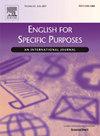“This study is an attempt to”: Metadiscursive nouns in L1 and L2 Applied Linguistics research article abstracts
IF 2.7
1区 文学
Q1 LINGUISTICS
引用次数: 0
Abstract
This paper offers a corpus-based study of how metadiscursive nouns are used in English RA abstracts published in Chinese-language journals and international journals by Chinese L2 writers in comparison to RA abstracts published by English L1 writers in Applied Linguistics across two decades. It is found that L1 writers employ the most metadiscursive nouns in Applied Linguistic RA abstracts, while L2 writers employ the least in their Chinese journal abstracts. Variations in metadiscursive noun use are found between L1 writers' RA abstracts and L2 writers' international RA abstracts in the purpose move. Functional categories also demonstrate an under-employment of metadiscursive nouns in the moves of background and purpose in L2 RA abstracts in comparison with their L1 counterparts. Over two decades, metadiscursive noun use has seen a decrease in frequencies in both L1 and L2 RA abstracts. In particular, L2 writers’ international journal RA abstracts have witnessed a marked shift in the overall use and functional categories in the purpose move and the method move. The variations may be driven by academic socialization, publishing practices and conventions, and disciplinary paradigm shift. The practical implications of the findings are also discussed concerning the instruction of using English for publication purposes.
“本研究是一种尝试”:元话语名词在L1和L2应用语言学研究中的文章摘要
本文以语料库为基础,研究了近20年来中国第二语言作者发表在中文期刊和国际期刊上的英语RA摘要与英语第一语言作者发表在《应用语言学》杂志上的RA摘要中元话语名词的使用情况。研究发现,母语作者在应用语言学期刊摘要中使用的元话语名词最多,而二语作者在中文期刊摘要中使用的元话语名词最少。母语作者的元话语名词摘要与二语作者的国际RA摘要在目的移动上存在差异。功能范畴还表明,在二语RA摘要的背景和目的移动中,元话语名词的使用不足。二十年来,在第一语言和第二语言的RA摘要中,元话语名词的使用频率有所下降。特别是,二语作者的国际期刊RA摘要在目的移动和方法移动的总体用途和功能类别上发生了显著的变化。这种变化可能受到学术社会化、出版实践和惯例以及学科范式转变的驱动。本文还讨论了研究结果对英语出版教学的实际意义。
本文章由计算机程序翻译,如有差异,请以英文原文为准。
求助全文
约1分钟内获得全文
求助全文
来源期刊

English for Specific Purposes
LINGUISTICS-
CiteScore
5.70
自引率
8.00%
发文量
41
审稿时长
62 days
期刊介绍:
English For Specific Purposes is an international peer-reviewed journal that welcomes submissions from across the world. Authors are encouraged to submit articles and research/discussion notes on topics relevant to the teaching and learning of discourse for specific communities: academic, occupational, or otherwise specialized. Topics such as the following may be treated from the perspective of English for specific purposes: second language acquisition in specialized contexts, needs assessment, curriculum development and evaluation, materials preparation, discourse analysis, descriptions of specialized varieties of English.
 求助内容:
求助内容: 应助结果提醒方式:
应助结果提醒方式:


